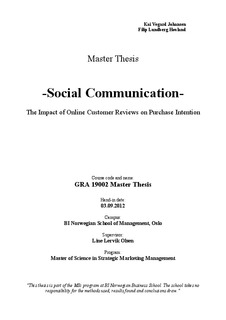| dc.description.abstract | Consumer-generated product reviews have proliferated online. Driven by the notion that customers’ decision to purchase a product is influenced by the information they obtain from online customer reviews, this thesis examines the impact of online customer reviews on purchase intention. To do so, the research integrates traditional communication theories, in particular social communication by Hovland (1948), with the Elaboration Likelihood Model (ELM) to build a theoretical model. Importantly, the model draws on Cheung and Thadani’s (2010) literature review on individual-level eWOM research, concluding that there is no existing study simultaneously examining the impact of all the elements of social communication (communicator, stimuli and response) on purchase intention. This study outlines a research framework that can provide insight into this area. The thesis provides a thorough review of the state of research in eWOM. Based on the review, five hypotheses where developed and tested using a 2(high involvement vs. low involvement x 2(high argument quality vs. low argument quality) x 2(disclosure of source vs. no disclosure of source) experimental design. The model is investigated quantitatively and the empirical testing was carried out by developing two scenarios, two hotel reviews, and one reviewer profile in order to manipulate argument quality, involvement and source credibility. A total of 253 respondents participated in the experiment. The main finding of the study is that the quality of online customer reviews has a positive effect on consumers’ purchasing intention. The study was not able to reveal any significant main effect of source credibility, meaning that a reviewer’s virtual credential is neither a significant nor a sufficient indicator that readers systematically or heuristically use to evaluate eWOM messages. Overall, this suggests that source credibility might have a different role in a CMC context and underlines the notion that people deliberate on the credibility of eWOM to a greater extent than traditional WOM when seeking online product recommendations. Moreover, the study failed to produce any significant interaction effects, as argument quality and source credibility did not interact with the subjects’ degree of involvement. This stands in contrast with the multiple roles postulated by the ELM framework. These findings have implications for online sellers in terms of how to manage their online customer reviews. | no_NO |
